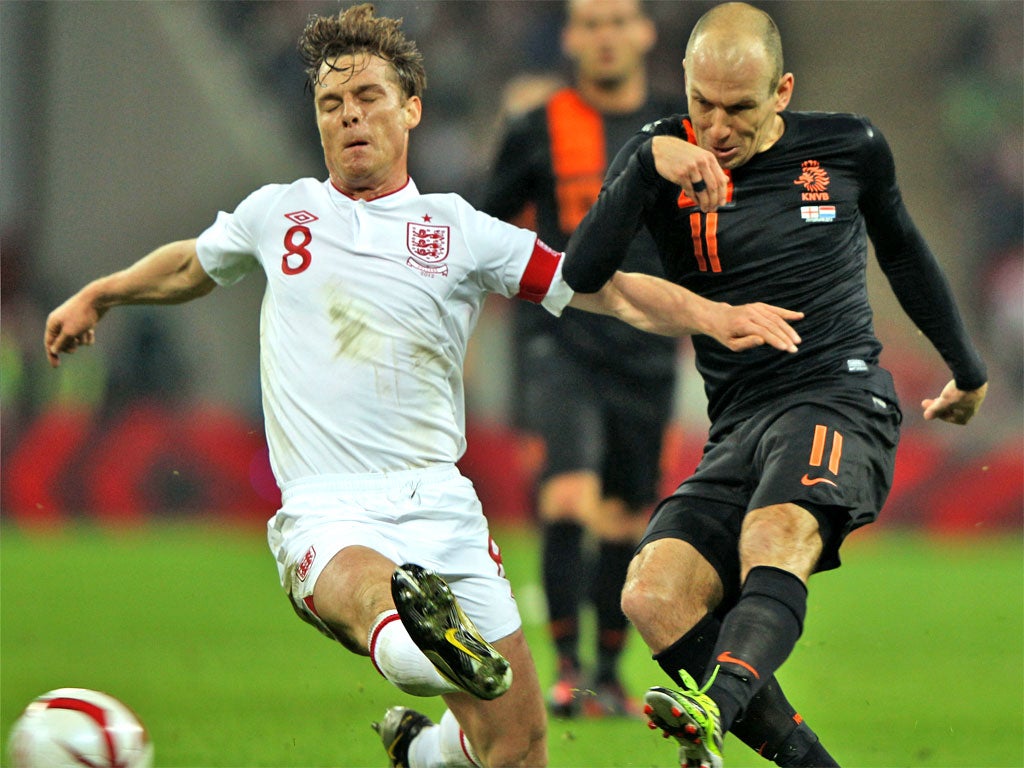From McDonald's kid to nation's leader: the rise of captain Scott
Jack Pitt-Brooke on how he emerged from Golden Generation's shadow

Scott Parker's elevation to the England captaincy is the latest peak in a long climb. Despite being born within months of Steven Gerrard, John Terry and Ashley Cole, he is not considered to be part of their "Golden Generation". He seems, at the age of 31, a relative stranger to elite football. And yet Stuart Pearce chose him ahead of the rest of the "Goldens" to lead England out last night.
Charlton Athletic (1997-2004)
The late arrival of Parker as an England regular might have been a surprise given his early promise. Not just for his appearance in the famous McDonald's advert in 1994, but his emergence in the late 1990s at his first club, Charlton Athletic. He made his Football League debut in 1997 aged 16, and his Premier League debut at 18. By 1999-2000, when Alan Curbishley's team held off Joe Royle's Manchester City to win the First Division, he had an important role.
2003 was Parker's breakout year at The Valley. In February he was picked by Sven Goran Eriksson for his first England squad, a friendly defeat to Australia, although he did not feature at Upton Park. He made his debut in a 3-2 friendly defeat to Denmark at Old Trafford.
Chelsea (2004-05)
Parker's excellence for club, and emergence for country, caught the attention of recently enriched Chelsea and, six months after Roman Abramovich's takeover, they bought him for £10m. Parker started to play in the Champions League, and was one of those surprisingly taken off in the infamous "Tinkerman" defeat to Monaco in the semi-final first leg which cost manager Claudio Ranieri his job. Jose Mourinho arrived from Porto, bringing with him £11m midfielder Tiago, and Parker's opportunities were cut. He broke his foot in December, and never played for Chelsea again.
Newcastle United (2005-07)
The following summer, Parker left the champions to join Newcastle : a necessary step down for someone keen to play. A good first year, and his assertive and vocal style won him the captaincy, ahead of Shay Given, when Alan Shearer retired. But despite being recalled by Steve McClaren, he was dropped again by his country after the disastrous 2-0 defeat to Croatia in Zagreb.
West Ham United (2007-11)
Curbishley signed him for West Ham for £7m in the summer of 2007. Fully settled back in London, he started to play the best football of his career. He equalled Trevor Brooking's record of three consecutive Hammer of the Year prizes from 2008-09 to 2010-11. That final year was his finest and saw him crowned as the FWA Footballer of the Year. Fabio Capello noticed, and Parker finally became an England regular.
Tottenham Hotspur (2011-)
A move from West Ham was no surprise last summer. Owner David Sullivan knew Parker did not want to be there, and he was sold to rivals Spurs. From where the consistent excellence, the Dave Mackay comparisons and, of course, last night's captaincy have followed. Parker, it seems, has arrived at the top.
Subscribe to Independent Premium to bookmark this article
Want to bookmark your favourite articles and stories to read or reference later? Start your Independent Premium subscription today.

Join our commenting forum
Join thought-provoking conversations, follow other Independent readers and see their replies